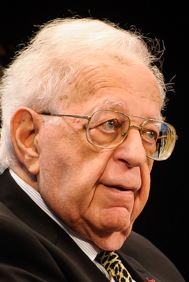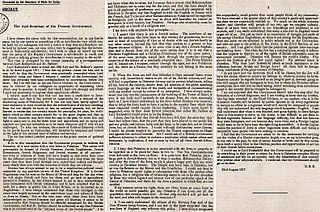
Zionism is a nationalist movement that emerged in Europe in the 19th century to enable the establishment of a homeland for the Jewish people in Palestine, a region roughly corresponding to the Land of Israel in Jewish tradition. Following the establishment of the modern state of Israel, Zionism became an ideology that supports the development and protection of the State of Israel as a Jewish state.
The National Religious Party was a political party in Israel representing the religious Zionist movement.

Revisionist Zionism is a form of Zionism characterized by territorial maximalism. Revisionist Zionism promoted expansionism and the establishment of a Jewish majority on both sides of the Jordan River.

Isratin or Isratine, also known as the bi-national state, is a proposed unitary, federal or confederate Israeli-Palestinian state encompassing the present territory of Israel, the West Bank and the Gaza Strip. Depending on various points of view, such a scenario is presented as a desirable one-state solution to resolving the Israeli–Palestinian conflict, or as a calamity in which Israel would ostensibly lose its character as a Jewish state and the Palestinians would fail to achieve their national independence within a two-state solution. Increasingly, Isratin is being discussed not as an intentional political solution – desired or undesired – but as the probable, inevitable outcome of the continuous growth of the Jewish settlements in the West Bank and the seemingly irrevocable entrenchment of the Israeli occupation there since 1967.
Arab Jews is a term for Jews living in or originating from the Arab world. The term is politically contested, often by Zionists or by Jews with roots in the Arab world who prefer to be identified as Mizrahi Jews. Many left or were expelled from Arab countries in the decades following the founding of Israel in 1948, and took up residence in Israel, Western Europe, the United States and Latin America.

Haim Arlosoroff was a Socialist Zionist leader of the Yishuv during the British Mandate for Palestine, prior to the establishment of Israel, and head of the political department of the Jewish Agency. In 1933, Arlosoroff was assassinated while walking on the beach in Tel Aviv.

Shlomo Avineri was an Israeli political scientist. He was a professor of Political Science at the Hebrew University of Jerusalem and member of the Israel Academy of Sciences and Humanities. He also served as a recurring visiting professor at the Central European University in Budapest and a fellow at Munich-based academic think tank Centrum für angewandte Politikforschung, offering advice to politicians. Avineri died on 1 December 2023 at the age of 90.
Neo-Zionism is a right-wing, nationalistic and religious ideology that appeared in Israel following the Six-Day War in 1967 and the capture of the West Bank and Gaza Strip. Neo-Zionists consider these lands part of Israel and advocate their settlement by Israeli Jews. Some advocate the transfer of Arabs not only from these areas but also from within the Green Line.
In world politics, Jewish state is a characterization of Israel as the nation-state and sovereign homeland of the Jewish people.

During the British rule in Mandatory Palestine, there was civil, political and armed struggle between Palestinian Arabs and the Jewish Yishuv, beginning from the violent spillover of the Franco-Syrian War in 1920 and until the onset of the 1948 Arab–Israeli War. The conflict shifted from sectarian clashes in the 1920s and early 1930s to an armed Arab Rebellion against British rule in 1936, armed Jewish Revolt primarily against the British in mid-1940s and finally open war in November 1947 between Arabs and Jews.
Yehouda Shenhav is an Israeli sociologist and critical theorist. He is known for his contributions in the fields of bureaucracy, management and capitalism, as well as for his research on ethnicity in Israeli society and its relationship with the Israeli-Palestinian conflict.
Muslim supporters of Israel refers to both Muslims and cultural Muslims who support the right to self-determination of the Jewish people and the likewise existence of a Jewish homeland in the Southern Levant, traditionally known as the Land of Israel and corresponding to the modern polity known as the State of Israel. Muslim supporters of the Israeli state are widely considered to be a rare phenomenon in light of the ongoing Israeli–Palestinian conflict and the larger Arab–Israeli conflict. Within the Muslim world, the legitimacy of the State of Israel has been challenged since its inception, and support for Israel's right to exist is a minority orientation. Pro-Israel Muslims have faced opposition from both moderate Muslims and Islamists.

Anti-Zionism is opposition to Zionism. Although anti-Zionism is a heterogeneous phenomenon, all its proponents agree that the creation of the modern State of Israel, and the movement to create a sovereign Jewish state in the region of Palestine—a region partly coinciding with the biblical Land of Israel—was flawed or unjust in some way.

While anti-Zionism usually utilizes ethnic and political arguments against the existence or policies of the state of Israel, anti-Zionism has also been expressed within religious contexts which have, at times, colluded and collided with the ethnopolitical arguments over Israel's legitimacy. Outside of the liberal and socialist fields of anti-Zionist currents, the religious arguments tend to predominate as the driving ideological power within the incumbent movements and organizations, and usually target the Israeli state's relationship with Judaism.

The common definition of Zionism was principally the endorsement of the Jewish people to return to their homeland, secondarily the claim that due to a lack of self-determination, this territory must be re-established as a Jewish state. Zionism was produced by various philosophers representing different approaches concerning the objective and path that Zionism should follow.

Racism in the Palestinian territories encompasses all forms and manifestations of racism experienced in the Palestinian Territories, of the West Bank, Gaza, and East Jerusalem, irrespective of the religion, colour, creed, or ethnic origin of the perpetrator and victim, or their citizenship, residency, or visitor status. It may refer to Jewish settler attitudes regarding Palestinians as well as Palestinian attitudes to Jews and the settlement enterprise undertaken in their name.
Labor Zionism or socialist Zionism refers to the left-wing, socialist variation of Zionism. For many years, it was the most significant tendency among Zionists and Zionist organizations, and was seen as the Zionist sector of the historic Jewish labour movements of Eastern Europe and Central Europe, eventually developing local units in most countries with sizable Jewish populations. Unlike the "political Zionist" tendency founded by Theodor Herzl and advocated by Chaim Weizmann, Labor Zionists did not believe that a Jewish state would be created by simply appealing to the international community or to powerful nations such as the United Kingdom, Germany, or the former Ottoman Empire. Rather, they believed that a Jewish state could only be created through the efforts of the Jewish working class making aliyah to the Land of Israel and raising a country through the creation of a Labor Jewish society with rural kibbutzim and moshavim, and an urban Jewish Proletariat.
The New Historians are a loosely defined group of Israeli historians who have challenged traditional versions of Israeli history, including Israel's role in the 1948 Palestinian expulsion and flight and Arab willingness to discuss peace. The term was coined in 1988 by Benny Morris, one of the leading New Historians. According to Ethan Bronner of The New York Times, the New Historians have sought to advance the peace process in the region.
Palestinianism is a term occasionally used to denote the national political movement of the Palestinian people. It is a relatively recent coinage whose origins are disputed. It gained currency by its use in the works of Edward Said and to describe a certain vein of theology opposed to Christian Zionism and that challenges Zionism and the right of Israel to exist.
Zionist antisemitism or antisemitic Zionism refers to a phenomenon in which antisemites express support for Zionism and the State of Israel. In some cases, this support may be promoted for explicitly antisemitic reasons. Historically, this type of antisemitism has been most notable among Christian Zionists, who may perpetrate religious antisemitism while being outspoken in their support for Jewish sovereignty in Israel due to their interpretation of Christian eschatology. Similarly, people who identify with the political far-right, particularly in Europe and the United States, may support the Zionist movement because they seek to expel Jews from their country and see Zionism as the least complicated method of achieving this goal and satisfying their racial antisemitism.








